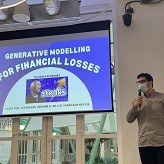Global Student Challenge on Generative Models of Financial Markets


The "Generative Modelling for Financial Losses" challenge was attended by nearly 300 students from masters' degrees specialising in finance and data science from 15 countries around the world and 66 leading schools and universities. It took place from October 25th to November 22nd, 2021 as part of the "Stress Test" Chair held by Emmanuel Gobet, Professor at the Centre for Applied Mathematics (CMAP*), and supported by BNP Paribas. The objective of the challenge was to respond to a lack of extreme data to test the resilience of banks to market shocks (stress-testing exercises). To overcome this problem, the participants formed into teams had to develop a generative model, i.e. one capable of simulating new credible data after training on real data, in this case from stock markets and prepared by researchers within the Chair.
The performance of the models developed was evaluated according to two criteria, which could be calculated from the data provided. The student teams were ranked according to two categories with a prize of 6,000 euros to be shared between the top three in each podium. The first criterion was to compare the distribution index by index, between real data and simulated data. The second criterion took into account the dependence of the financial indices on each other, i.e. their dynamics in relation to each other. For example, if in the data provided when the CAC (Paris) rose, the Nikkei (Tokyo) also rose, then the model had to show this dependency in its created data.
On December 15th, the winning teams in both categories presented their generative models after having exchanged with experts from BNP Paribas to confront them with the challenges of the banking industry.
The first place team for the criterion focusing on the dependence of data on each other is the aGENcy team, made up of Laurine Burgard-Lotz (Télécom SudParis), Riad El Otmani (Télécom SudParis), Louis Grenioux (Télécom SudParis), Karim Kassab (École polytechnique) and Walid Yassine (Ecole Polytechnique). They used a generative adversarial network approach (called GAN), i.e. an algorithm composed of two parts, one that produces new data, the "generator", and the other that seeks to determine whether the data is fake or not, the "discriminator", both parts being based on artificial neural networks.
These two parts of the network co-evolve and thus the data produced is very close to that used to train the algorithm. The aGENcy team has succeeded, in addition to focusing on the dependence of financial indices, in creating a network capable of credibly generating extreme data, which have a low chance of occurring but which are representative of financial crises.
The team that best met the criterion of similarity of distribution of data index by index was called the Winx team, composed of Sergio Bossou (Ecole Polytechnique), Swann Chelly (Ecole Polytechnique), Samson Cohen (Ecole Polytechnique - UPMC) and Gabriel Zeller (CentraleSupélec). Rather than building their model around a generative adversarial network, which is already widely used in this type of research, they used a Restricted Boltzmann Machine (RBM) approach, a particular type of artificial neural network, to model the likelihood of data via an artificial neural network. With this network, the Winx team developed and optimised new learning strategies from training data samples, creating a model capable of creating faithful and credible data.
Emmanuel Gobet is pleased with the success of the event: "We knew that the newly developed topic of generative models in risk management would most certainly generate a lot of interest, but the enthusiasm for this challenge and the massive participation of students throughout the competition exceeded our expectations. We are pleased to have been able to support the students in this modern and applied artificial intelligence project, directly linked to real banking risk issues.
*CMAP: a joint research unit CNRS, École Polytechnique - Institut Polytechnique de Paris
>> about the Chair:
Founded in 2018 and headed by Emmanuel Gobet, the "Stress Test, Risk Management & Financial Steering" Chair studies the resilience of banking activities to shocks of various kinds (credit, market, climate, cyber security, reputation...). Supported by BNP Paribas, this research chair benefits from their economic expertise and regulatory experience to better understand the issues and problems of the financial system. Thus, the applied mathematics work coordinated by Emmanuel Gobet proposes innovative approaches to risk modelling, simulation and statistical estimation.
 Support l'X
Support l'X